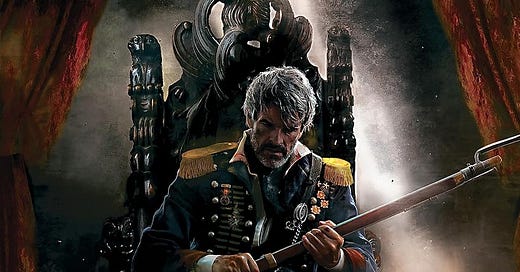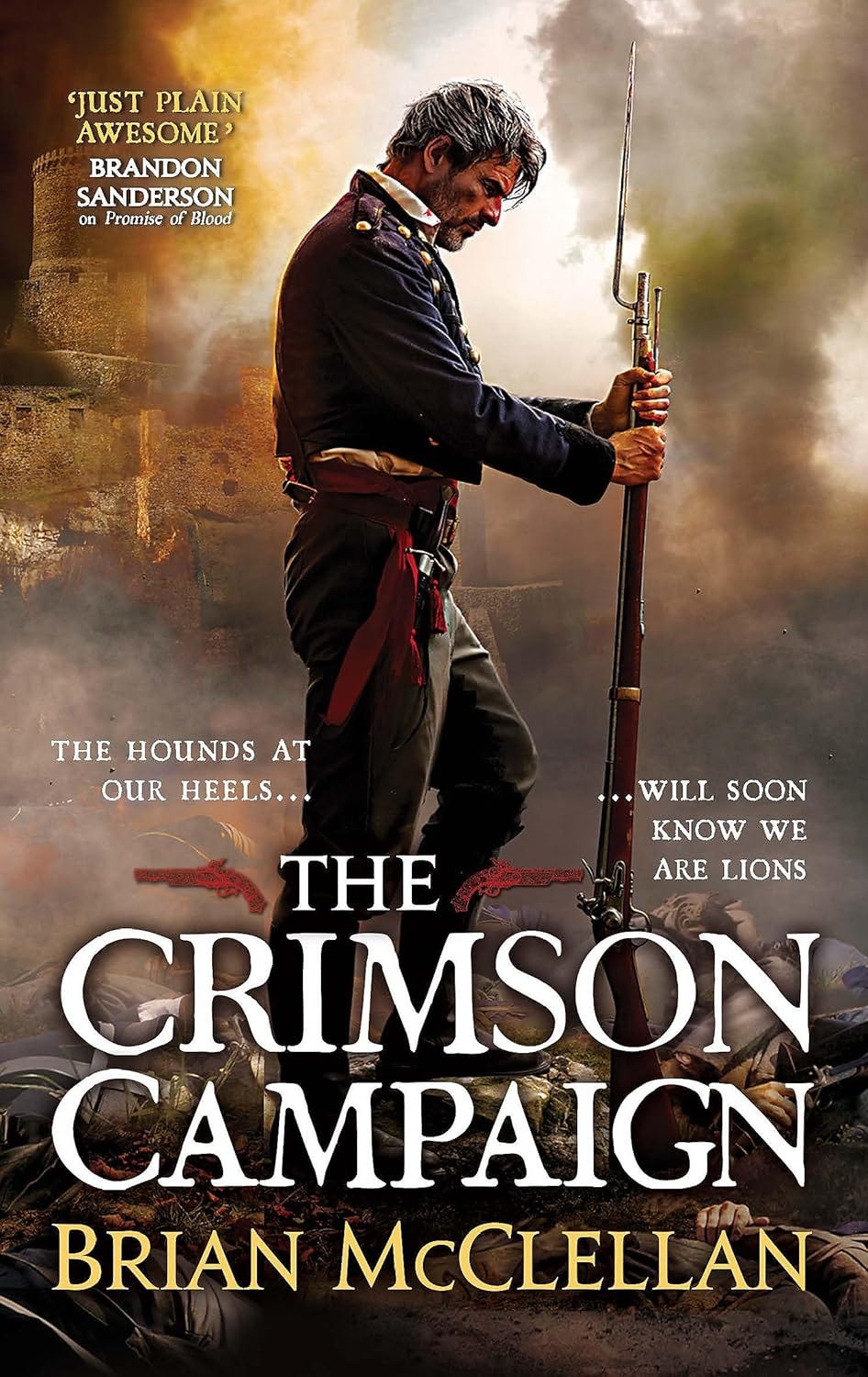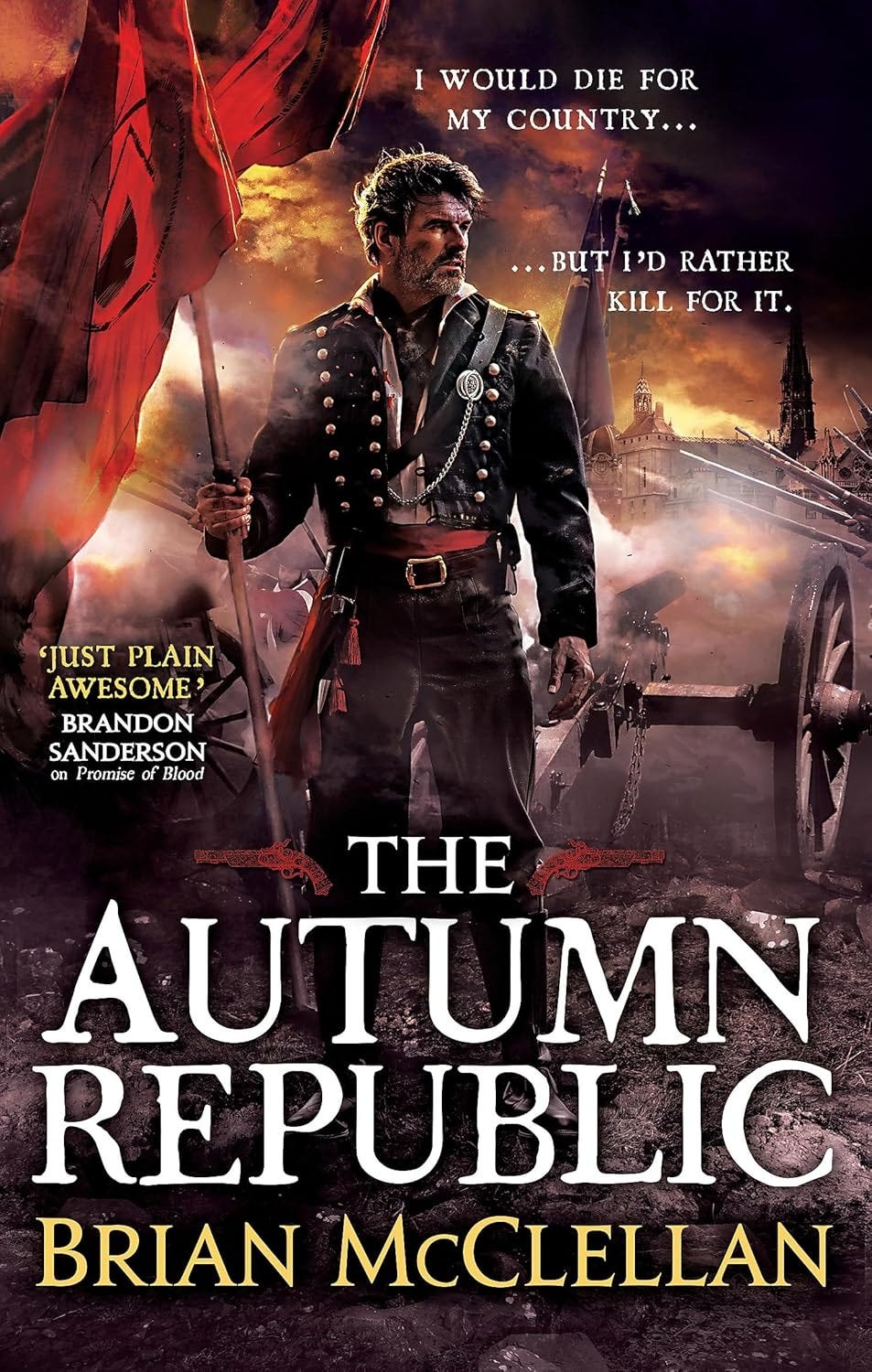Gunpowder, Magic, and Revolution: A Review of Brian McClellan’s Powder Mage Trilogy
A must-read for fans of action-packed, military-inspired fantasy fiction
Introduction
Most fantasy books feature knights and swords. This one, though, gives you snipers who use both guns and magic. Brian McClellan’s Powder Mage Trilogy is a fresh take on the genre, replacing medieval castles with Napoleonic warfare and flintlock rifles. And, for the most part, it works.
Falling under the subgenre of flintlock fantasy, The Powder Mage Trilogy is full of fast-paced action, warfare with and without magic, and political intrigue. There’s also an intriguing magic system and mysteries being investigated. All of this comes together and is supported by a wide cast of cast of characters, ranging from powerful soldiers to laundresses.
Though not a perfect book series by any means, The Powder Mage Trilogy is definitely worth reading.
What is the Powder Mage Trilogy?
Written by Brian McClellan, this series was first published between 2013 and 2015. It also has a whopping eleven spinoff novellas and short stories, and a sequel trilogy as well.
The first book, Promise of Blood, begins with a coup orchestrated by Field Marshal Tamas, a powerful Powder Mage and leader of the military in the country of Adro. The monarchy is weak and corrupt, and was about to become little more than a colony to their enemy nation, Kez. Seeing the people’s longtime suffering and also fueled by personal revenge, he executes the royal family and most of the aristocracy.
Following that, Tamas and the other main characters in the series must deal with the aftermath of the coup and everything that entails. This includes conspiracies both within and outside Adro, a war with Kez, and whispers about the return of gods, whom most consider myth.
The Setting: A World on the Brink of War
Taking place primarily in Adro, one of the Nine Kingdoms founded by the god Kresimir, the series explores various aspects of the country from its powerful politicians to servants to savvy businessmen to those in the criminal underworld. The other kingdoms are explored to varying degrees depending on their role in the story, and Kez is the one featured most prominently after Adro.
Some of the worldbuilding used by McClellan here takes inspiration from the French Revolution, such as the political turmoil from overthrowing the monarchy and the precedent it set for the world. Other influences include the technological level of society in the late 18th to early 19th centuries in Europe. But the biggest influence is that of military tactics and warfare, which look to past historical generals such as Napoleon Bonaparte.
Where the series distinguishes itself from the real world is through the addition of various forms of magic, all of which impact everything from daily life to fighting on the battlefield.
Magic Meets Muskets: The Unique Magic System
Magic users in this world are divided into three categories:
Priveleged - the most powerful class of magic, Priveleged are the closest to traditional sorcerers from the stereotypical fantasy image of one. They can control the elements and are usually forcefully recruited in service of the monarchy.
Powder Mages - the titular Powder Mages literally snort gunpowder and use it for fuel to enhance their abilities as soldiers, giving them far greater strength, speed, and senses. They can also control gunpowder, allowing them to accomplish feats such as curving fired bullets or causing gunpowder to explode over great distances.
Knacked - though they are the least powerful magic users, the Knacked are not to be estimated. They each have a unique ability, ranging from having a perfect memory to never needing to sleep.
The Main Characters: Heroes, Rogues, and Revolutionaries
The Powder Mage Trilogy features a large cast of main and supporting characters from most levels of society:
Field Marshal Tamas - a brilliant, ruthless military genius and powerful Powder Mage, Tamas leads the plot to overthrow the Adran monarchy with good motivations. He is fearless, but far from perfect as he struggles with being a good father to his son Taniel.
Taniel Two-Shot - already a seasoned campaigner and war hero, Taniel is also a powerful Powder Mage. He is impulsive, somewhat reckless, and has issues with authority that stem from his relationship with his father. This is balanced by his loyalty to his friends and bravery when faced with increasingly dangerous situations.
Ka-poel - a young woman who supports Taniel, Ka-poel is a deadly sorceress from far away who employs powerful magic different from everyone else. Although mute, she has no trouble expressing herself, particularly when it comes to Taniel.
Adamat - a private investigator and Knacked with a perfect memory, Adamat is drawn into the revolution against his will by Tamas because of his skill as a detective. His brilliance lies not in his combat abilities but in his mind, and he desperately wants to protect his family from the revolution’s repercussions.
Nila - a beautiful laundress serving an aristocrat, Nila finds herself thrown into the chaos of the revolution and is powerless to do anything, yet she tries her best to protect the aristocrat’s son from those who would harm him.
There are more characters too, of course, but these are all the major players.
Themes: Revolution, Loyalty, and the Cost of Power
The Powder Mage Trilogy is more than just flintlock fights and magic-fueled duels - it’s an exploration of revolution, power, loyalty, war, duty, and divinity. Tamas’s coup comes with noble intentions, but is balanced by him and his revolutionaries getting their hands dirty, and it sets off a chain of events that no one could have predicted.
A core theme of the series is that of loyalty, and whether someone can really be trusted. Tamas has to deal with multiple traitors from his own army while Taniel has to decide between his loyalty to his father, his country, his friends, and his own beliefs. Adamat, meanwhile, is placed in a position where he has to make difficult choices with no easy answer just to keep his family alive and safe. McClellan makes every alliance and relationship feel fragile, and that keeps readers guessing as to what happens next.
Through the character of Tamas, the story also explores leadership and what comes with it. Despite his ultimate pursuit of justice, Tamas is more than pragmatic and fully understands that a man in his position has to make difficult tactical and moral choices that may not even bear fruit. The Field Marshal doesn’t hesitate to make such choices if he believes that there is a possibility of it helping their cause, showcasing a different kind of loyalty, one which is not to an individual but to an ideal.
War, too, is something that shapes The Nine but it isn’t glorified in the series. Being a hero and acting with honour aren’t the priority; victory and survival are, no matter how brutal or harsh the path is. Tamas in particular understands that, making him an effective military leader in times of war. Taniel too deals with war and death in his own way, suffering because of the physical, mental, and emotional toll his life as a soldier and Powder Mage takes on him.
Hovering over all this is the question of what makes someone a god, and whether gods actually exist in the first place. The people of Kez, for instance, worship Kresimir as a god while Tamas rejects divinity and the right to rule they grant to royalty, considering it another form of oppression. But as the series progresses, several characters, both major and minor, consider the role of gods and faith in their lives and their world.
In the end, McClellan’s books don’t offer any easy, clearcut answers to the difficult questions they pose, either for the reader or the characters in the story.
My Thoughts on The Powder Mage Trilogy
Up until now, it may sound like I’ve done nothing but sing praises for The Powder Mage Trilogy, and that it’s one of the best fantasy series I’ve ever read. Well, it’s not. Not quite.
For starters, while all the action is brilliantly written, whether it be on the battlefield or in smaller fights, there isn’t much else going on. Sure, there’s Adamat and his investigations, which make for a nice break from warfare, but the series focused a bit too much on war and not enough on other elements, at least for my liking. The character of Nila sticks out like a sore thumb for much of the story, and her chapters were often my least favourite.
Another significant drawback, in my opinion, was the lack of layered, complex characters as well as the main cast not having good enough character arcs. So many characters seem to be the same throughout the series, and don’t grow or change enough. The antagonists don’t fare much better either, with all of them being very one-note and simple.
The writing itself is serviceable, with crisp dialogue and detailed battles, with the latter in particular being a standout feature of the series. Weaving in suspense and tension through all the plotlines and subplots (which take place simultaneously) is another strength of McClellan’s, and that made the books very difficult to put down at various points. Adamat, with comparatively slower pacing in his storyline, was my favourite character because the story took the time to explore his personality, motivations, and conundrums. I would’ve liked to see more of his interactions with the criminal underworld of Adro.
Why You Should Read It…
Fast-Paced and Action-Packed – the story hooks you immediately and keeps the momentum going with intense battles and war tactics.
Unique Magic System – Powder Mages can enhance their abilities by consuming gunpowder, making for creative and explosive combat.
Flintlock Fantasy Setting – it’s a refreshing change from medieval fantasy, blending muskets, revolutions, and Napoleonic warfare.
No Slow Build-Up – if you dislike fantasy books that take a long time to get going, this one jumps right into the action.
…Or Not Read It.
Less Emphasis on Deep World-Building – the world is immersive but not as lore-heavy as Tolkien or George R.R. Martin’s works.
More Action Than Philosophy – while thought-provoking, it prioritizes battles and strategy over deep, introspective themes.
Prose is Functional, Not Poetic – the writing is not as lyrical or descriptive as some other fantasy authors.
Characters Lack Depth – If you prefer deeply personal, introspective narratives over fast-moving plots, this may not be for you.
Final Rating
7.5/10
And that’s it! I hope I’ve helped you decide whether The Powder Mage Trilogy is for you or not through this review.
Next time, I’ll come to you with an exploration of the various subgenres of mystery fiction and how they’re both similar and different from each other. See you in around ten days!
Thanks for reading,
Madhav





